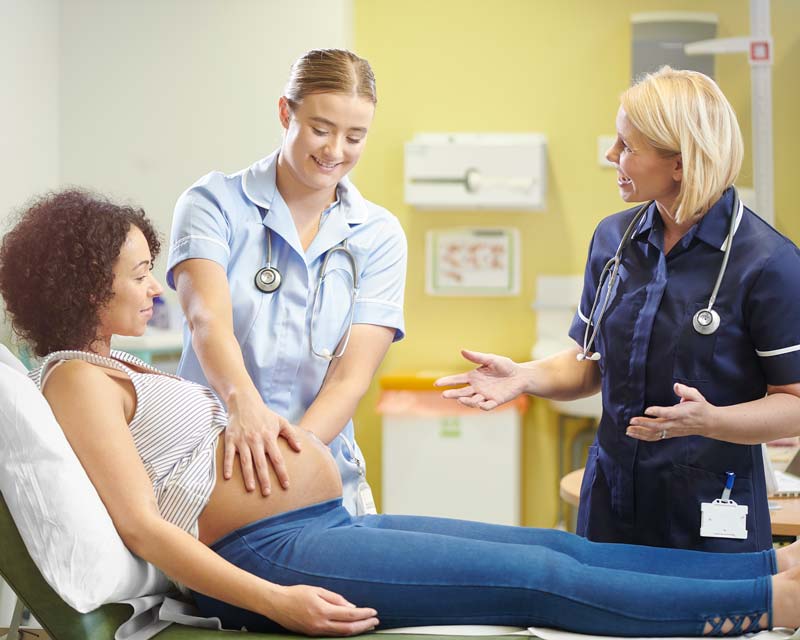
Researchers take next steps to understand COVID-19’s impact on people infected during pregnancy
 It’s well-established that addiction is a lifelong disease. For people who are pregnant and addicted or have a history of substance abuse or addiction, the right support can make a lifesaving difference for the parent and baby.
It’s well-established that addiction is a lifelong disease. For people who are pregnant and addicted or have a history of substance abuse or addiction, the right support can make a lifesaving difference for the parent and baby.
Pregnancy and the realization that another human life is depending on you can be powerful motivation to find a road to recovery. But it can also trigger stress, exhaustion, painful childhood memories and mood disorders that can increase the chance of relapse. At such a critical time, specialized, compassionate care and support are vital.
The STEPP (Substance Abuse Treatment, Education and Prevention Program) Clinic at The Ohio State University Wexner Medical Center is an outpatient co-located “one-stop shop” that provides specialized care — and offers a safe, validating and nurturing community for those facing both parenthood and addiction. Patients enrolled in the program receive high-risk obstetric care, along with medication-assisted treatment, counseling, education and peer support.
The clinic also provides care for those with infectious diseases, such as treatment for hepatitis C, that can be related to addiction and can put patients and babies at risk. The program also works closely with Ohio State’s addiction treatment facility (Talbot Hall) for patients who require inpatient care, with warm handoff back to STEPP after discharge.
Launched in 2013, the clinic has a record of reduced preterm births and other markers of success. The clinic has served more than 1,300 pregnant patients, helping them and their babies get a good start. Now the team is working to expand services to patients for up to one year after giving birth, to provide continuing support during the vulnerable postpartum period.
Overcoming barriers to care is a primary goal for Kara Rood, MD, a specialist in the Division of Maternal Fetal Medicine at the Ohio State Wexner Medical Center and director of the STEPP Clinic. For various reasons, many people who are addicted or are at risk may not be getting regular prenatal care, or it may not be easily accessible. In addition to referrals from obstetricians, many of the clinic’s patients come from emergency departments, community addiction programs or through word of mouth. People who’ve been through the program or who are going through it often refer friends who are pregnant.
Dr. Rood believes those word-of-mouth referrals — and the clinic’s overall success — are a testament to the program’s approach, building a sense of community and connection for those who may not have many social connections or support systems.
“Unfortunately, many of these individuals have developed a lot of mistrust with the health care system in general because of the stigma and how they’ve been treated, and how addiction hasn’t always been truly recognized as a disease and not a choice,” Dr. Rood says. “We really have to build a relationship and a community-based feel for them to truly open up and allow us to help them. They have to isolate themselves from a lot of their support people because those people often have untreated addictions. And historically, many come from families that have a longstanding history of addiction.
“Or, because of some of the choices they made while trying to cope with their addiction, they burned a lot of bridges and severed a lot of relationships with their family, so they become very isolated, and having a new baby really isn’t a one-person job. I think that’s why our outcomes have been so good. We’ve really been able to build a sense of community, so they have their health care team, and they also have connections with others who are going through the same kinds of struggles.”
The clinic brings together specialists in high-risk obstetrics, psychiatry, social work and counseling, as well as other specialties as needed. Patients receive weekly prenatal care, as well as individual counseling, group therapy sessions and education on infant care, breastfeeding and other topics. They’re encouraged to share their experiences and ask questions, and their care is tailored to their needs as much as possible.
In addition, the clinic prescribes medication proven to help with recovery from opiate addiction and safe birthing.
“We prescribe buprenorphine, and that comes in different formulations,” Dr. Rood says. “One is Subutex, which is just buprenorphine, and the other one is Suboxone, which is both buprenorphine and naloxone.
“We primarily use Suboxone, but both are safe and effective in pregnancy. We try very hard to do what we consider an individualized plan. So if someone has a counselor or a group that they’ve been going to, or they’re comfortable with their current provider and the medication for addiction treatment they’ve been prescribed, we can still work with them and provide prenatal education on what to expect during and after delivery. In most cases, there is no reason to discontinue or change what is already working.”
A major focus for Dr. Rood and the clinic is spreading the word to help health care providers ensure that people who need addiction care during or after pregnancy don’t fall through the cracks in the health care system.
“You have to ask about addiction or a history of addiction, and it’s not just ask once and be done,” Dr. Rood says. “There are a lot of stressful potential triggers during pregnancy because addiction is a lifelong disease that can’t really be cured. So as the midwife or the nurse practitioner or the physician who’s providing prenatal care, it really is important to continue to be supportive and to ask those questions.”
Dr. Rood also favors the use of a universal screening tool, such as the tool validated by the American College of Obstetricians and Gynecologists, to identify those who are at risk. But she stresses that it’s always important for health care providers to talk to patients who are pregnant and might be struggling.
“It’s just taking the time to ask. Besides ‘Is your baby moving? Any bleeding? Any contractions? Any leaking fluid?’ just remember to say, ‘Hey, it’s been a little while since I’ve seen you, and I just want to check on you because I know this can be hard. How are you doing?’” she says. “Those open-ended questions to actually assess how well they’re doing, and then paying attention to how they respond — that’s how we can care for those who may not always know how to ask for help, no matter what kind of help they need.”